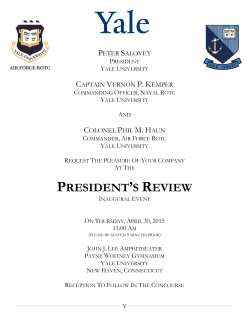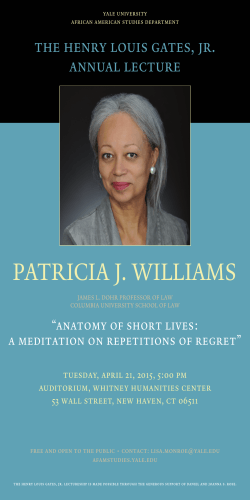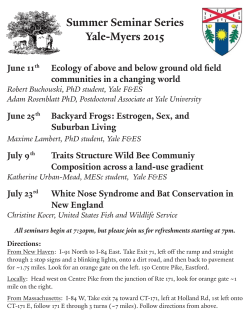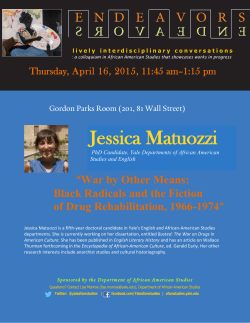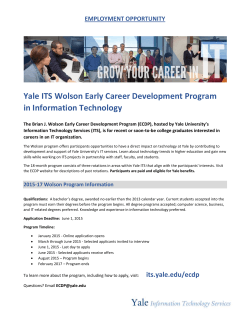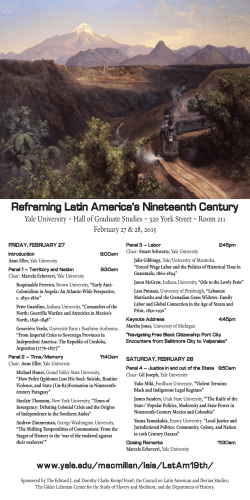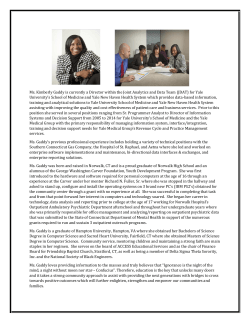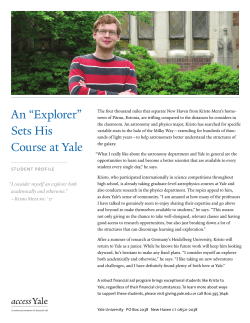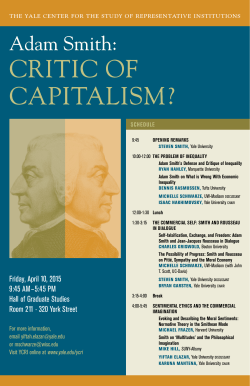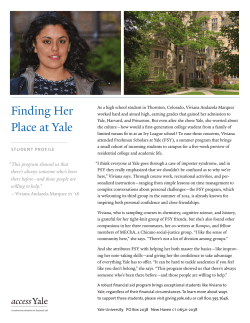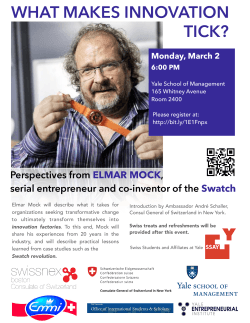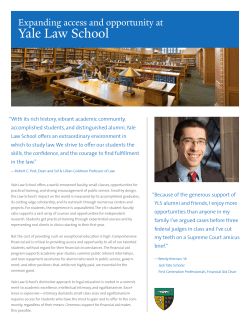
capture - Yale Center for Emotional Intelligence
The Emotion Revolution is a joint initiative between the Yale Center for Emotional Intelligence and Born This Way Foundation to build awareness around the critical role of emotions in learning, decision-making, and both student and teacher wellness and effectiveness. Our mission is to empower youth to drive the national conversation that charges schools with increasing their focus on building positive school climates and integrating social and emotional learning (SEL) to improve young people’s prospects for leading happy, healthy, and productive lives. In the inaugural year, with support from Facebook and dozens of key partners, we will: • Launch a national survey to capture high school students’ current and hoped for emotional experiences in school. • Hold a summit at Yale featuring Lady Gaga and Yale President, Peter Salovey, that will serve as a platform to both unveil the findings and offer youth the opportunity to share their ideas for creating improved learning environments with key educators, academics, and policy makers. • Create momentum around the national SEL movement • Provide youth and educators with the knowledge, skills, and resources they need to accelerate positive changes in their schools and communities. Overview of this document Here, we provide copies of (1) Emotion Revolution Survey, and (2) the approval letter from Yale’s Institutional Review Board (IRB). The survey on the http://www.emotionrevolution.org website was created by researchers from the Yale Center for Emotional Intelligence. The survey is copyrighted © Yale University. The team is lead by Dr. Marc Brackett and Dr. Zorana Ivcevic. The project is supported by Facebook and a wide-range of nonprofit organizations have partnering with us, including HopeLab, The Collaborative for Academic and Social and Emotional Learning (CASEL), The New Teacher Center, Greater Good Science Center, and many school districts around the United States, including state departments of education. This year, the survey is intended for high school students. Please do not take the survey as a way to review the items because that will interfere with data collection. All of the survey questions are in this document for your review. If you are a school district that would like to partner with our us to create a campaign around the Emotion Revolution to collect data in your district, please contact us at [email protected]. A limited number of school districts will have the opportunity to receive their own private link and receive a report of their district’s data. If you have questions about the research, please contact us at [email protected] Students can access the survey directly at: www.tinyurl.com/emorev2015 Please also promote the survey on social media using the following: #emotionrevolution, @BTWFoundation, @YaleEmotion. A Dropbox account with logos, messaging, images, and ideas for building a campaign can be found at: www.tinyurl.com/emotionrevolutiontoolkit. The Survey Welcome! The Emotion Revolution empowers high school students - like you - to create schools and communities where emotions matter. Please take this short survey so your voice is heard! At the end you will learn how to join the Emotion Revolution. On the following page you will be asked to agree to participate. Consent Form: How do you feel at school? How would you like to feel at school? Let your voice be heard! Hi, my name is Marc Brackett, and I am a scientist at Yale University. My team is doing a research study to examine how high school students feel at school. We would like to ask you to take part in this study by completing a short online survey (taking approximately 8 min). We hope that what we learn about high school students around the nation will help us understand how students typically feel at school so that we can work on making schools the best possible places for students to learn and thrive. All of your responses will be anonymous; we will not ask your name or other information that could let us know who you are. Only the researchers involved in this study will have access to your answers. Your responses will be captured on this website and stored securely. Participation in this study is voluntary. You are free to decline to participate, to end participation at any time for any reason, or not to answer any questions. If you have any questions about this study, you may contact me at [email protected] or the Human Subjects Committee, 55 College Street, New Haven, CT 06520 (203-785-4688 or [email protected]). Thank you! • • Yes, I agree to participate No, I don’t want to participate What grade are you in? • 8 or below • 9 • 10 • 11 • 12 • Other Note. Only students in grades 9-12 are presented the survey. Think about the range of positive and negative feelings you have in school each day. How do you typically feel when you are in school? _______________ _______________ _______________ Now think about the feelings you would really like to have in school each day. How do you wish you felt each day in school? _______________ _______________ _______________ Use the slider to show how often you have felt each of these emotions this school year, from 0 never to 100 - always. Note. Slider presented next to each emotion term. Happy Miserable Bored Respected Frustrated Proud Mad Interested Lonely Discouraged Afraid Hopeful Accepted Fun Angry Nervous Confident Lively Hopeless Connected Ashamed Joyful Sad Scared Cheerful Stressed Relieved Grateful Use the slider to show how often you have experienced each of the following this school year, from 0 - never to 100 - always. Note. Slider presented next to each statement. Students' voices matter in my school. When I put in the effort, I do well. I learn ways to handle strong emotions. My teachers explain the importance of what we learn. People have been mean and cruel to me. I find ways to learn about things I am interested in. Scores on standardized tests are valued more than anything else. I learn how to complete projects from start to finish. Teachers encourage creativity in schoolwork. There is an adult I could go to for help if I had a personal problem. Students get along well. I learn skills to help me achieve my personal goals. I have meaningful homework. Bullying is a problem in my school. Competition among students is encouraged. I receive support to finish whatever I begin. Teachers encourage discussion of class material. There is at least one teacher who knows my interests. My classmates and I help each other out. Students can make choices about assignments they work on. Teachers deliver engaging and interesting lessons. Students learn how to give presentations in class. What I’m learning is relevant to my goals in life. I attend... Public school Private school ` Other (please state): ________________ How old are you? How do you describe yourself? Male Female Trans male Trans female Different identity (please state):_____________________ What state do you live in? [drop down list of US states and territories] How would you describe yourself? White/Caucasian Black/African-American American Indian or Alaska Native Native Hawaiian or Other Pacific Islander Asian/Asian-American Hispanic Biracial or Multiracial Other (please state): _______________ Do you consider yourself to be: Heterosexual or straight Gay or lesbian Bisexual Other (please state): ________________ Think of a ladder with 10 steps representing where people stand in the United States. At step 10 are people who are the best off – those who have the most money, the most education, and the most respected jobs. At step 1 are the people who are worst off – those who have the least money, least education, and the least respected jobs or no job. Where would you place your family on this ladder? Is your family closer to being worst off or best off? Click on one spot on the ladder to describe your family. worst off 0 1 2 3 4 5 6 My family is… Where did you complete this survey? Home School After school setting (other than home) How did you hear about this survey? From my school From an organization (e.g., DoSomething.org etc.) From an ad or feed on Facebook From a friend (shared through social media, text, or e-mail) From Lady Gaga or Born This Way Foundation Other (please state): ___________________ 7 8 9 best off 10 Approved IRB Yale University Human Subjects Committee 53-55 College Street P.O. Box 208010 New Haven, CT 06520-8010 Phone (203) 785-4688 [email protected] To: Marc Brackett From: Human Subjects Committee Date: 03/30/2015 HSC Protocol #: 1502015350 Study Title: Emotion Revolution: A Study of High School Students’ Perception of School Climate Committee Action Expedited Approval HSC Action Date: 03/30/2015 Approval Date: 03/30/2015 Expiration Date: 03/29/2016 Submission Type: Initial Application The above-referenced protocol was approved following expedited review by the Human Subjects Committee. The project was found to be of minimal risk and to meet the approval requirements under University IRB policy and 45 CFR 46 as applicable. _________________________________________________________________________ Review Comments: • The study has been approved as minimal risk for one year. • The HSC has reviewed the Robert Wood Johnson Foundation grant proposal #15-004562 and found it to be consistent with research activities described in the protocol. • The Committee finds that parental permission can be waived for this study per federal regulation 45 CFR 46.116(d). • • This part of the regulations states that 1) this research involves no more than minimal risk to the subjects, 2) the waiver or alteration will not adversely affect the rights and welfare of the subjects, 3) the research could not practicably be carried out without the waiver and 4) whenever appropriate the subjects will be provided with additional pertinent information after participation. Documentation of consent waived under 45 CFR 46.117(c); assent/consent will be obtained online. The study conforms to 45 CFR 46.404 It is the Principal Investigator’s responsibility to obtain review and continued approval before the expiration date. You may not continue any research activity beyond the expiration date without approval by the Institutional Review Board. Adverse Reactions: Investigators are required to promptly report any unanticipated problems or complaints to the committee. If necessary a member of the IRB will be assigned to look into the matter. If the problem is serious, approval may be withdrawn pending IRB review.
© Copyright 2026
